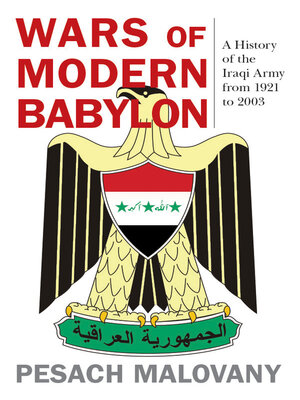Wars of Modern Babylon
ebook ∣ A History of the Iraqi Army from 1921 to 2003 · Foreign Military Studies
By Pesach Malovany

Sign up to save your library
With an OverDrive account, you can save your favorite libraries for at-a-glance information about availability. Find out more about OverDrive accounts.
Find this title in Libby, the library reading app by OverDrive.



Search for a digital library with this title
Title found at these libraries:
| Library Name | Distance |
|---|---|
| Loading... |
As long as there have been wars, victors have written the prevailing histories of the world's conflicts. An army that loses—and especially one that is destroyed or disbanded—is often forgotten. Nevertheless, the experiences of defeated forces can provide important insights, lessons, and perspectives not always apparent to the winning side.
In Wars of Modern Babylon, Pesach Malovany provides a comprehensive and detailed history of the Iraqi military from its formation in 1921 to its collapse in 2003. Malovany analyzes Iraqi participation in the 1948, 1967, and 1973 Arab wars against Israel as well as Iraq's wars with the Kurds during the twentieth century. His primary focus, however, is the era of Saddam Hussein (1979–2003), who implemented rapid and significant military growth and fought three major wars: against Iran from 1980 to 1988, and against coalition forces led by the United States in 1991 and 2003. He examines the Iraqi military at the strategic, operative, and tactical levels; explains its forces and branches; and investigates its use of both conventional and unconventional weapons.
The first study to offer a portrait of an Arab army from its own point of view, Wars of Modern Babylon features interviews with and personal accounts from officers at various levels, as well as press accounts covering the politics and conflicts of the period. Malovany also analyzes books written by key figures in the Iraqi government and the army high command. His definitive chronicle offers English speakers new and overlooked perspectives on critical developments in twentieth-century history. The book won the Israel Yitzhak Sade Award for Military Literature in 2010.







